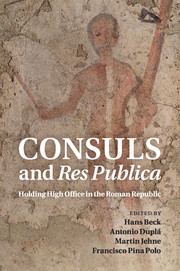Book contents
- Frontmatter
- Contents
- Preface
- Contributors
- The republic and its highest office: some introductory remarks on the Roman consulate
- Part I The creation of the consulship
- Part II Powers and functions of the consulship
- Part III Symbols, models, self-representation
- Chapter 8 The Roman republic as theatre of power: the consuls as leading actors
- Chapter 9 The consul(ar) as exemplum: Fabius Cunctator's paradoxical glory
- Chapter 10 The rise of the consular as a social type in the third and second centuries bc
- Chapter 11 Privata hospitia, beneficia publica? Consul(ar)s, local elite and Roman rule in Italy
- Part IV Ideology, confrontation and the end of the republican consulship
- Bibliography
- Index of persons
- Subject index
Chapter 10 - The rise of the consular as a social type in the third and second centuries bc
from Part III - Symbols, models, self-representation
Published online by Cambridge University Press: 07 September 2011
- Frontmatter
- Contents
- Preface
- Contributors
- The republic and its highest office: some introductory remarks on the Roman consulate
- Part I The creation of the consulship
- Part II Powers and functions of the consulship
- Part III Symbols, models, self-representation
- Chapter 8 The Roman republic as theatre of power: the consuls as leading actors
- Chapter 9 The consul(ar) as exemplum: Fabius Cunctator's paradoxical glory
- Chapter 10 The rise of the consular as a social type in the third and second centuries bc
- Chapter 11 Privata hospitia, beneficia publica? Consul(ar)s, local elite and Roman rule in Italy
- Part IV Ideology, confrontation and the end of the republican consulship
- Bibliography
- Index of persons
- Subject index
Summary
Striving hard for decades to win the consulship was the way of life most acceptable for members of the Roman elite. This seems to be one of the very few facts which is not contested in modern research on Roman politics in the middle and late republic. But what happened when these men succeeded? The term in office, often prolonged for fulfilling some additional tasks as proconsuls at some distance from Rome, kept the proud magistrates busy. But what came afterwards when they returned to the city? Traditionally, we tend to see the consulares in the centre of Roman politics as embodying the common good in contrast to the incumbent consuls, dominated by personal ambition. But we must ask when this habit came into existence and how the consular role changed over time. What I want to present here are only some reflections on the origins and the rise to eminence of the consular as a social type in the third and second centuries.
Evidently, we should not expect the perspectives of magistrates to be the same from the beginning of the republic to its end or even further. The significance of office for personal rank should not be estimated too highly for the patrician state, when the primores were probably the leading members of patrician families, perhaps with some prerogatives for the gentes maiores in relation to the gentes minores. They were well known and resourceful, whether they served as magistrates or not. Some impression of how the life of a Roman aristocrat could have unfolded in archaic Rome may be extracted from the anecdote of Cincinnatus. According to Livy, Cincinnatus was busy ploughing his fields when some prominent Romans arrived to announce his appointment as dictator. Whether this actually happened is not my concern here, nor am I interested in the highly moralistic colouring of the episode in later reports, praising the simple life of the ancestors. In this context, it is only relevant that later Romans saw the lives of their forefathers as oscillating between public obligations and private activities outside Rome. This could have been the normal pattern of life for the leading men until at least the third century bc. Between offices a successful nobilis took care of his economic interests and lived the social life of the landed gentry. Temporary retirement from the business of the res publica was certainly not unusual or a reason for criticism. Senators stayed in their villae outside Rome and were called to senate meetings by viatores. Cicero and the rest of the later tradition explicitly characterized this way of life as a peculiar habit of the past. The elder Cato still praised hard work with his own hands as an honourable deed even for wealthy landowners, but in his lifetime this was already rather old-fashioned. In the early republic, however, the Roman patrician did his public service as a magistrate and a senator just as the Roman small farmer made his contribution as a soldier: regularly, but not continuously.
- Type
- Chapter
- Information
- Consuls and Res PublicaHolding High Office in the Roman Republic, pp. 211 - 231Publisher: Cambridge University PressPrint publication year: 2011
- 7
- Cited by



